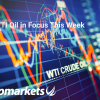OPENING CALL: The Australian share market is expected to open lower. The SPI200 futures contract expected to open down 16 points.
OPEC and Russia are so far holding off pumping more oil to fill potential gaps in global supplies after an attack in Saudi Arabia over the weekend led to a major crude disruption, officials said.
The U.S. is poised to impose new tariffs on European Union exports over the bloc’s subsidies to Airbus, the EU’s trade chief said, citing the Trump administration’s unwillingness to settle a dispute over aircraft makers.
Overnight Summary
Each Market in Focus
Rallying resources shares carried Australia’s equities market just into the green as the surge in crude prices following weekend attacks on Saudi Arabia’s oil facilities countered broad weakness across other sectors. The S&P/ASX 200 finished up 4.3 points at 6673.5, thanks to a 4.0% jump in the energy subindex and 1.6% rise by materials.
Heavily weighted BHP was among the biggest drivers, climbing 3.2%, while Woodside Petroleum gains 4.3% and Oil Search jumps 6.5%. Bellamy’s Australia soars 55%, the biggest percentage advance on record, after agreeing to a takeover bid from a Chinese dairy company. Still, the big banks are all weaker and industrials, telecom and utilities sectors drop at least 1% each.
U.S. stocks fell and haven assets like gold and the Japanese yen gained after a weekend attack on Saudi Arabian oil facilities sent crude prices surging.
The Dow Jones Industrial Average shed 140 points, or 0.5%. The S&P 500 lost 0.4%, with 10 of the 11 sectors in the index in the red. The energy sector was the lone gainer, up 2.3%. The Nasdaq Composite dropped 0.4%.
Brent crude, the global oil benchmark, rose 14% to $68.48 a barrel. It had earlier jumped as much as 19.5% to $71.95 a barrel, but retraced some of those gains after initial concerns over how badly oil output would be affected ebbed on Saudi vows to restart production. U.S. oil futures rose 13% to $62.23 a barrel.
The rise came after attacks on Saudi oil production facilities Saturday, which knocked out 5.7 million barrels of daily production. The kingdom is racing to restore roughly one-third of the disrupted production by day’s end Monday.
On Sunday, President Trump said he authorized the release of oil, if needed, from the Strategic Petroleum Reserve to help offset cost increases. The U.S. holds about 600 million barrels of emergency crude products, said Oswald Clint, a senior analyst for Sanford C. Bernstein & Co.
The last time U.S. crude futures gained at least 10% in a day while all three major U.S. indexes slumped was in the depths of the financial crisis on Feb. 19, 2009, according to Dow Jones Market Data.
U.S. energy companies saw benefits from the supply disruption, with Devon Energy up 7.2%, Marathon Oil rising 8.5% and Hess up 8.1%. Meanwhile, shares of airlines slumped as investors fretted over what the potential impact of higher fuel prices could mean for airline profits. Shares of American Airlines, Delta Air Lines and United Airlines shed at least 2.6% apiece.
Gold futures finished solidly higher, at their highest price in just over a week, after an attack on Saudi Arabian oil production sent oil values skyrocketing and investors turning to haven assets, including bonds and precious metals.
December gold on Comex gained $12, or 0.8%, to settle at $1,511.50 an ounce, after registering on Friday a weekly decline of 1.1%. The settlement was the highest for a most-active contract since Sept. 6, FactSet data show.
Silver for December delivery added 45.7 cents, or 2.6%, to settle at $18.026 an ounce, following a weekly loss of 3%, according to FactSet data.
Other metals traded on Comex ended lower, with December copper down 2.2% at $2.6405 a pound. October platinum shed 1.4% to $939.20 an ounce and December palladium finished at $1,592.20 an ounce, down 0.5%, after marking a record settlement on Thursday.
The world is flush with excess oil, a factor that put a cap on the spike in crude prices following the attacks on the heart of Saudi Arabia’s oil industry.
U.S. crude futures ended the day 15% higher at $62.90 a barrel, their largest one-day climb since January 2009 but still below where they were when futures opened Sunday evening. They are at their highest level since May.
Brent crude, the global gauge of prices, was up 14% at $68.51 late in its trading session, also heading for its largest climb in more than a decade, per a Dow Jones Market Data analysis of figures from FactSet.
While the moves were some of the largest advances of the past 30 years for oil, some analysts said they were still relatively contained given the scope of the attack in the world’s largest crude exporter.
The currencies of oil-producing countries strengthened against the U.S. dollar, with the Russian ruble up 0.6%, the Norwegian krone up 0.2% and the Canadian dollar up 0.2%.
Energy-importer Turkey saw the lira fall 0.5% against the U.S. dollar.
Meanwhile, U.S. stocks fell and haven assets like gold and the Japanese yen gained after a weekend attack on Saudi Arabian oil facilities sent crude prices surging.
The Japanese yen rose 0.2% against the U.S. dollar.
European markets settled broadly lower as jitters about how the attacks on Saudi Arabia oil installations could affect the global economy eclipse gains for oil company shares.
The FTSE 100 Index fell about 0.6%, or 46 points, at 7321 while the pan-European Stoxx Europe 600 dropped 0.6% and the DAX finished down 0.7% and CAC-40 0.9% lower.
Shares in airlines fall as investors ponder the prospect of higher fuel prices, while miners and financial stocks also decline. Shares in oil majors and oil-industry equipment and service suppliers, such as BP, Royal Dutch Shell, Total, Eni, John Wood Group and Subsea 7, dominate the risers as the prices of Brent crude and U.S. light crude surge more than 10%.
In Asia, regional equity markets proved relatively resilient. South Korea’s Kospi rose 0.6% and the Shanghai Composite was flat. The Japanese stock market was closed for a holiday.
In Hong Kong, the Hang Seng Index fell 1.1% after another weekend of violent protests, although shares in Chinese oil companies such as Cnooc Ltd. and PetroChina Co. rallied. Geely Automobile was the top loser on the benchmark, with shares down 3.1%. Hong Kong Exchanges & Clearing ended the session 2.4% lower after the LSE rejected its takeover bid.







 Access +10,000 financial
instruments
Access +10,000 financial
instruments

